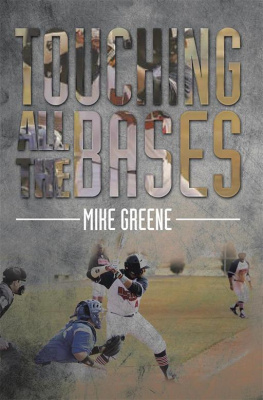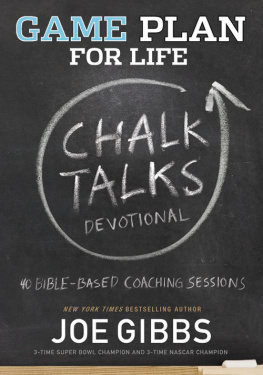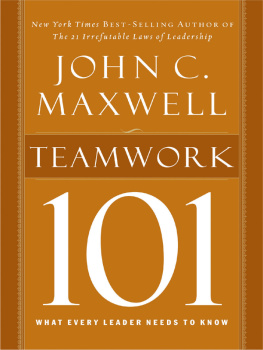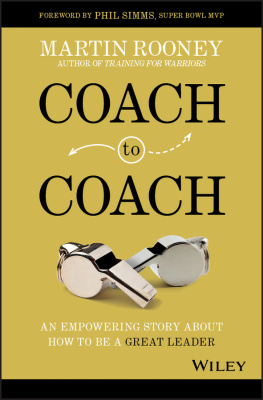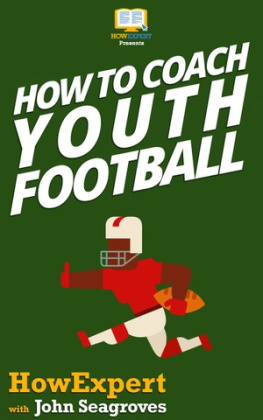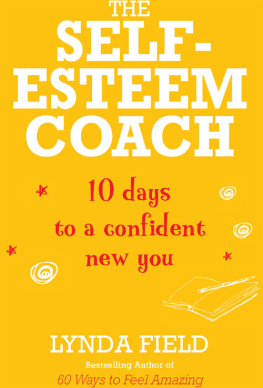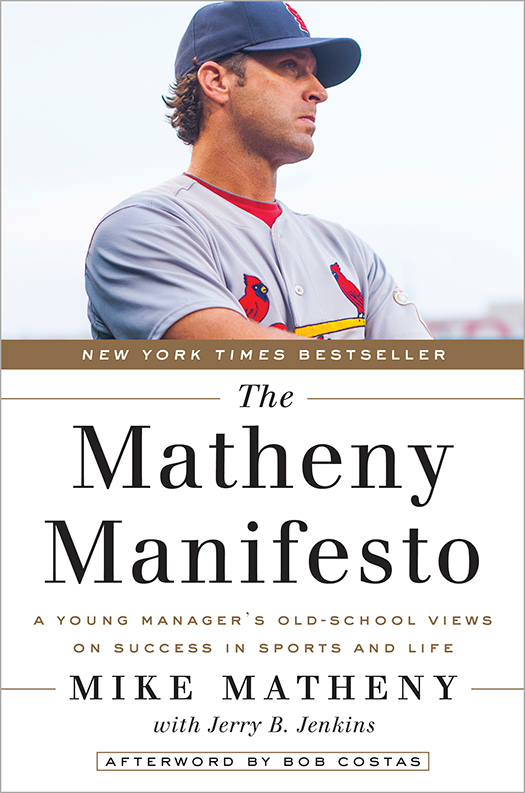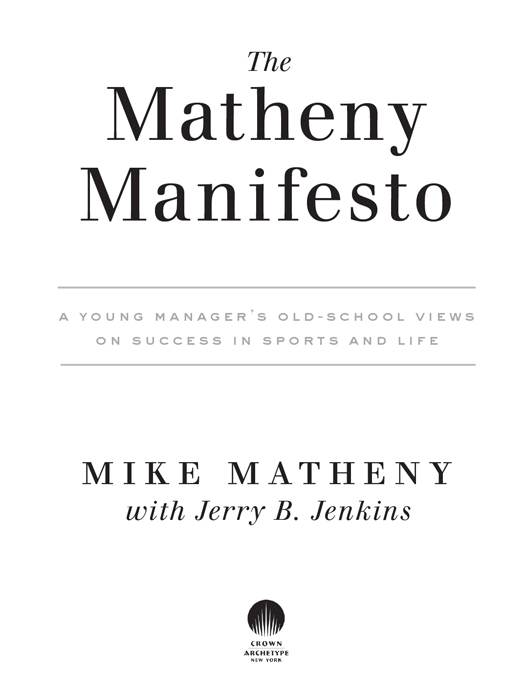Copyright 2015 by Mike Matheny and Jerry B. Jenkins
All rights reserved.
Published in the United States by Crown Archetype, an imprint of the Crown Publishing Group, a division of Random House LLC, a Penguin Random House Company, New York.
www.crownpublishing.com
Crown Archetype and colophon is a registered trademark of Random House LLC.
Library of Congress Cataloging-in-Publication Data
Matheny, Mike, 1970
The Matheny Manifesto : a young managers old school views on success in sports and life / Mike Matheny with Jerry Jenkins. First Edition.
pages cm
ISBN 978-0-553-44669-2
1. Matheny, Mike, 1970- 2. Baseball managersUnited StatesBiography. 3. AthletesUnited StatesConduct of life. I. Jenkins, Jerry B. II. Title.
GV865.M326A3 2015
796.357092dc23
[B]
2014041741
ISBN 978-0-553-44669-2
eBook ISBN 978-0-553-44671-5
Cover photograph by Rob Tringali/Contributor/Getty Images
v3.1_r3
To the greatest influences on my life, my parents:
Jerry and Judy Matheny
Thank you for your humility and wisdom,
for the right word at the right time,
and for silence when it was appropriate
so I could grow on my own.
And to Kristin and the kids:
Tate, Katie, Luke, Jake, and Blaise
You bless me beyond my ability to express.
Thank you for your love and supportno matter what.
A CKNOWLEDGMENTS
Thanks to the coaches who taught me more than just the sport: Ron Golden, Dave Starling, Bill Freehan, Bob Humphreys, Tim Ireland, Chris Bando, Phil Garner, Dave Ricketts, Dave McKay, Dave Duncan, and Tony La Russa.
May I be a responsible vessel to pass along both the baseball and the life lessons.
Special thanks to a coach I never had the honor of meeting but whose thoughts and ideas impacted me more than anyones. If this book causes even one aspiring coach to research the teachings of John Wooden, the greatest coach in the history of collegiate sports, I will consider the project a success.
I am indebted for life to my personal board, amazed at your willingness to serve so selflessly.
Finally, Thanks be to God for His indescribable gift! (2 Corinthians 9:15) I cant say it better than that.
C ONTENTS
The Letter That
Went Viral
No professional athlete wants to face the end of his career, but its twice as hard when youre in the prime of life from the neck down. By the close of the 2006 season, I had spent thirteen years behind the plate in big-league baseball and was still, remarkably, in one piece. No one in the game takes the abuse a catcher does, yet at thirty-five I believed I still had a few more seasons in me.
The problem was, I hadnt had an at bat or caught a ball since the last day of May. I had suffered what many of my counterparts in pro football havea concussion so severe it affected my vision, my ability to think straight, even my ability to engage in normal conversation.
Of all things, it appeared to have been caused by a foul tip to the face mask. But that had to have been only the last straw. Such a shot can ring your bell, even several times a game, but no one had ever heard of one causing real damage. I knew better. Over the years I had endured too many violent collisions at home plate, slamming the back of my head to the ground, rattling my brain.
What followed were the worst eighteen months of my life, as I endured batteries of tests and the fear of never recovering, and before spring training of 07, I had to face that my playing career was over. As I slowly returned to health, I helped out with one of my sons school teams, served as a roving instructor for the St. Louis Cardinals, involved myself in some business ventures, and got on with life, trying to figure out what my future held.
In 2008, some local parents approached me about coaching their youth baseball team the following spring. My own ten-year-old would be on that team, and as a product of youth baseball myself, I found that the more I considered it the stronger I felt about it.
Letting go of major-league baseball was not easy, and I needed something like this while preparing for normal life. I had been raised old school in a small midwestern town, taught to do the right thing because it was the right thing, to never take shortcuts, to be disciplined and selfless and humble. My wife, Kristin, and I were trying to raise our five kids that way, and frankly, we werent seeing too many other young people with those kinds of values.
Resolve began to grow in me. If I was going to do this, there would be only one way to go about it: all or nothing. This wouldnt be a hobby, a diversion, just your typical local youth baseball team. Wed do it right.
But what if that wasnt what the other parents had in mind? Maybe they just wanted a former big leaguer in the dugout. It was only fair that I spell it out so thered be no surprises. If they just wanted a coach who knew the game, that was fair. There were plenty to choose from, and I was happy to be just a parent.
But if they wanted a guy who saw this as an opportunity to build character in young menadmittedly very young menand teach them life lessons far beyond baseball skills, well, then we could talk.
Frankly, I worried that all they wanted was an elite traveling team with cool equipment and a reputation for winning. The last thing I needed was to hear from every parent who thought his kid ought to be pitching or hitting third or whatever.
I knew I had better clarify things up front for my sake and for theirs. They deserved the chance to withdraw their invitation for me to be the coach before they finalized a decision they would regret.
So on a flight home from New Jersey one night after a guest appearance on the Major League Baseball Network, I pulled out my laptop and wrote them a letter. I didnt call it a manifesto, let alone my manifesto. That label didnt come until later, when it somehow found its way to the Internet and went viral, and someone got the idea that Matheny and manifesto had a ring to it. It has since taken on a life of its own, to my great surprise, but really, the genesis of it was just that I wanted to be clear with the other parents. I wasnt a know-it-all and sure didnt feel I had all the answers. I just didnt want to waste anybodys time.
The letter came to about five single-spaced pages (I didnt hold anything back), and the first person I shared it with was my former big-league teammate John Mabry, who would also have a son on the team and be my assistant coachthat is, if anybody still wanted me after this. John immediately told me, in very colorful language, that though he agreed with my views, if I dared read it to the other parents, I was not to associate his name with it in any way.
Blame it on my concussion, but while I left John out of it, I plunged ahead.
A few nights later, Kristin and I invited the other parents to our home, and after some refreshments and pleasantries, I asked them to gather in front of the fireplace so I could share a few thoughts. I got a quick read of how things were going over once I got started.
Suffice it to say, what became known as the Matheny Manifesto began as the proverbial lead balloon. My voice was the only sound in a cozy family room otherwise silent and still as a mausoleum:
Dear Fellow Parents:
Ive always said I would coach only a team of orphans. Why? Because the biggest problem in youth sports is the parents.


